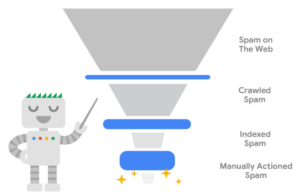What is Black Hat SEO?

What is Black Hat SEO?
Black Hat SEO refers to the use of unethical and manipulative techniques to achieve high search engine rankings. These techniques are in direct violation of search engine guidelines and are intended to exploit loopholes in search algorithms for quick gains. While these tactics may provide short-term benefits, they often result in long-term penalties and can damage a website’s reputation.
Black Hat SEO Techniques
- Keyword Stuffing: This involves excessively and unnaturally incorporating keywords into a webpage, with the aim of manipulating search engine rankings.
- Paid Backlinks: Purchasing links from other websites to artificially boost a site’s authority and popularity.
- Content Spinning: Generating multiple variations of the same content by using automated software or tools, in an attempt to manipulate search rankings and avoid duplicate content penalties.
- Schema Markup Manipulation: Misusing structured data markup to deceive search engines and display misleading information in search results.
- Private Blog Networks (PBNs): Creating a network of interlinked websites solely for the purpose of manipulating search engine rankings.
- Comment/Forum Spam: Posting irrelevant or promotional comments with links to manipulate search rankings and gain traffic.
- Cloaking: Showing different content to search engine bots and website visitors, with the intention of ranking for irrelevant keywords.
- Doorway Pages: Creating low-quality web pages optimized for specific keywords, which act as entry points to redirect users to other pages.
Black Hat SEO Forum?
One of the most well-known online communities for Black Hat SEO is BlackHatWorld. The Black Hat SEO section of the forum provides a space for users to discuss ideas and methods of improving website rankings through the use of manipulative tactics. However, it’s important to note that the use of Black Hat SEO techniques can result in penalization from search engines and damage to a website’s reputation and credibility, so it’s generally not a recommended approach to SEO.
Black Hat SEO Backlinks?
Black hat SEO backlinks refer to the use of unethical and manipulative techniques to generate backlinks for a website. Black hat backlinks are created through techniques like buying links, link farms, and comment/forum spam. These techniques aim to manipulate search engine rankings and can result in penalties from search engines like Google.
Acquiring high-quality backlinks is an important part of SEO, but it’s crucial to use ethical practices to avoid penalties from search engines. Instead of using black hat SEO techniques, website owners can focus on creating high-quality content and using legitimate link-building methods like guest posting, broken link building, and creating shareable content.
The Negative Impact on Search Rankings?
The use of black hat SEO techniques can result in a negative impact on a website’s search rankings. Google algorithms have become smarter in detecting and penalizing websites that use manipulative or deceptive tactics to rank higher in search engine results pages (SERPs).
Search engines are designed to deliver the most relevant and credible results to users, so any tactics that try to game the system and manipulate algorithms are typically frowned upon by search engines. Websites that utilize black hat SEO techniques can expect to see a decrease in organic traffic, a drop in rankings, and even removal from search engine results pages entirely.
Furthermore, once penalized, affected websites have to work hard to recover their rankings, which can take months or even years and require a complete overhaul of their SEO strategy. Therefore, it’s highly recommended to stay away from black hat SEO techniques and implement ethical and sustainable white hat SEO methodologies for long-term success.
Long-term Consequences for Website Reputation?
When it comes to a website’s reputation, the long-term consequences of engaging in black hat SEO practices can be severe. Black hat techniques violate search engine guidelines and can lead to various negative outcomes, including damage to a website’s reputation.
One of the potential long-term consequences is the loss of trust and credibility among users and industry peers. Engaging in unethical practices raises doubts about the integrity and authenticity of a website1. It can result in negative word-of-mouth, which can spread quickly in online communities and impact the overall perception of the website.
Furthermore, when search engines detect black hat SEO tactics, they may penalize the website by lowering its rankings or even removing it from search results altogether1. This can have a detrimental impact on organic traffic and visibility, making it harder for the website to attract and retain visitors.
Reputation is crucial in the online world, as it influences not only user perception but also business opportunities. Potential partners, clients, and customers may hesitate to associate with a website that has a tarnished reputation. It can lead to missed collaborations, reduced customer trust, and ultimately, financial losses.
To safeguard and improve website reputation, it is essential to focus on ethical SEO practices that provide long-term benefits. Employing white hat SEO techniques, such as creating high-quality content, building genuine relationships with other websites, and following search engine guidelines, can help establish a positive reputation1.
It is worth noting that building a strong website reputation takes time and effort. Consistency, transparency, and a commitment to ethical practices are key in establishing a trustworthy online presence that can endure.
Reasons to Avoid Black Hat SEO?
There are several reasons why engaging in black hat SEO tactics should be avoided. Below are some of the most significant reasons:
Ethical Considerations and User Experience: Black hat SEO practices violate ethical and moral principles by manipulating search engine algorithms to achieve higher rankings. This can lead to a negative user experience, as users may encounter irrelevant, low-quality, or spammy content. When users experience this, it decreases their trust and confidence in the website.
Building a Sustainable and Credible Online Presence: Black hat SEO techniques may provide short-term benefits, but they are not sustainable for long-term growth. In contrast, white hat SEO techniques focus on creating a high-quality website that provides value to users and establishes trust and credibility. By building a sustainable online presence, businesses can establish a loyal following and earn positive word-of-mouth.
Long-term Success through White Hat SEO Practices: In the long run, white hat SEO tactics are more effective than black hat SEO practices. White hat SEO emphasizes creating high-quality content, building quality backlinks, and following search engine guidelines. These techniques result in sustainable growth and long-term success in attracting more traffic, establishing authority, and building a positive reputation.
Risk of Penalties and Consequences: Black hat SEO tactics run the risk of being discovered by search engines, which can result in penalties such as a drop in search rankings or even a complete removal from search results. Once penalized, it can be challenging to recover and regain search engine trust.
Keeping Up-to-Date with Search Engine Guidelines: Black hat SEO tactics are typically used to bypass search engine guidelines to achieve quick results. However, search engine companies are continually updating their guidelines to improve search quality, prevent spam, and reward high-quality websites. Failing to keep up with these changes can lead to a higher risk of penalties and a negative impact on search rankings.
Avoiding black hat SEO tactics is essential for businesses that want to establish and maintain a reputable online presence. While black hat SEO may provide short-term benefits, the potential long-term consequences typically outweigh the advantages. Instead, focusing on ethical white hat SEO practices can provide sustained, long-term benefits and establish an online presence that users trust and value.

How Google Fights Spam
Google employs various measures to combat and penalize websites engaged in Black Hat SEO techniques. Some of the methods include:
- Algorithm Updates: Regular updates to search algorithms, like Google Penguin and Google Panda, aim to identify and penalize websites employing manipulative techniques.
- Manual Reviews: Google’s team manually reviews websites to identify spammy practices and take appropriate action.
- User Feedback and Reports: Google relies on user feedback and reports to identify websites violating their guidelines and takes necessary action.
- Link Analysis: Google uses advanced algorithms to analyze the quality and relevance of backlinks, penalizing websites involved in paid or low-quality link schemes.
- Machine Learning: Google employs machine learning algorithms to identify patterns and behaviors associated with spam websites, enabling them to make better judgments and algorithmic adjustments.


